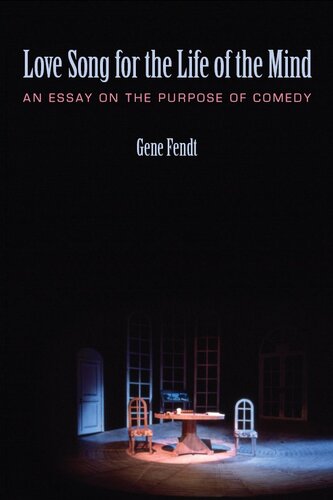

Most ebook files are in PDF format, so you can easily read them using various software such as Foxit Reader or directly on the Google Chrome browser.
Some ebook files are released by publishers in other formats such as .awz, .mobi, .epub, .fb2, etc. You may need to install specific software to read these formats on mobile/PC, such as Calibre.
Please read the tutorial at this link: https://ebookbell.com/faq
We offer FREE conversion to the popular formats you request; however, this may take some time. Therefore, right after payment, please email us, and we will try to provide the service as quickly as possible.
For some exceptional file formats or broken links (if any), please refrain from opening any disputes. Instead, email us first, and we will try to assist within a maximum of 6 hours.
EbookBell Team

4.7
86 reviewsLove Song for the Life of the Mind develops the view of comedy that, the author argues, would have been set out in Aristotle's missing second book of Poetics. As such it is both a philosophical and a historical argument about Aristotle; and the theory of comedy it elucidates is meant to be trans-historically and trans-culturally accurate.
After a preface that sets out the primacy and centrality of mimesis for both individual and societal development, the argument about the dramatic arts begins from a crux in Aristotle's extant analysis of tragedy where he seems to contradict himself on the kind of plot that is the best for tragedy. Gene Fendt argues, against a variety of formalist and intellectualist interpretations, that the only way out of the problem is through reference to the final cause of tragedy as a catharsis of pity and fear. This fundamental tenet of Aristotle's theory of tragedy, the author maintains, is the first clue to understanding comedy, which also must be defined not formally but in reference to its final cause. Fendt argues that the final cause of comedy must be a catharsis of eros and sympathy. In the course of his argument he shows how that catharsis is made available to the excessive, the deficient, and the virtuous members of the audience in Aristophanes' Acharnians, Shakespeare's As You Like It and Stoppard's Arcadia.
The book closes by exploring how this Aristotelian argument might underlie the Symposium's claim that the fine artist of tragedy should also create fine comedy. The book will appeal both to those interested in Aristotle and those interested in dramatic theory and criticism.
ABOUT THE AUTHOR:
Gene Fendt, professor of philosophy at the University of Nebraska-Kearney, is author of several books including Is Hamlet a Religious Drama?: An Essay on a Question in Kierkegaard, Platonic Errors: Plato, A Kind of Poet, Works of Love?: Reflections on Works of Love, and For What May I Hope? Thinking with Kant and Kierkegaard.